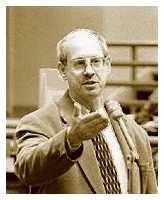
Comments on O'Neill's Debt to and Argument with Krashen
Stephen Krashen Responds to O'Neill's Criticisms
This is Stephen Krashen's reply to Robert O'Neill's rebuttal
comments about
acquisition and learning in a recent ESL MiniConference Online debate. You are
also invited to follow subsequent exchanges between Krashen and O'Neill
in shorter notes on our letters page.
On the terms acquisition and learning
Can adults acquire?
My position is that the evidence supports the hypothesis that adults can
and do acquire and do so quite well. As I noted in my previous post,
adults also follow a predictable sequence of acquisition and adult second
language acquisition is, like child language acquisition, a result of
comprehensible input.
O'Neill claims that the stages of learning (his term) a foreign language
are only predictable if adults make any kind of progress at all. Of
course.
O'Neill also appears to claim that adult second language acquisition is
different from child language acquisition because some adults give up, get
distracted, bored, etc. This does not happen to children acquiring their
first language. The input/comprehension hypothesis claims, however, that
given comprehensible input and a low affective filter, acquisition is
involuntary and inevitable. One has no choice but to acquire. Those adults
who refuse, give up, etc. have not had this kind of input, even if they
have lived in the country where the language was spoken for many years.
For details, see the discussion of fossilization in Krashen (1985).
Note that I am not claiming that all adults acquire second languages
perfectly. They don't. But they do quite well, given the right
circumstances. (1)
O'Neill also feels adult acquisition (learning?) is different because
adults look for axiomatic rule systems. Not all adults do. In fact, it may
be that a small minority do, those who have had considerable schooling and
who think that the structure of language is intrinsically interesting.
I will go even farther. I will disagree with O'Neill's claim that grammar
works well with some people if this is a claim that conscious learning of
grammar alone can result in high levels of competence. There is a clear
role for conscious learning, as I have tried to state in many books and
papers, but it is a peripheral role, and I don't think anybody ever
acquired a language from grammar alone. Comprehensible input must always
be present (see e.g. Krashen, 1991).
Interactive activities, reading and communicative language teaching
I share O'Neill's critiques of certain aspects of communicative language
teaching. I agree that some interactive activities are contrived and do
not contain much comprehensible input. I strongly agree that the use of
specially constructed readers, such as the Longman series and similar
series, has been undervalued. There is tremendous evidence that
interesting, comprehensible reading has a very positive effect on foreign
language development, second language development, and of course first
language development.
Beniko Mason has been a champion of the use of pedagogical readers for
this purpose, and has shown in a series of studies that EFL students make
impressive gains reading pedagogical readers, supplemented with easy
authentic reading, outperforming comparisons in traditional classes. See
eg Mason and Krashen (1997).
Stephen Krashen
2002 ESL MiniConference Online
Note
1 Genie (mentioned by O'Neill) was a teenager when she was discovered and
could thus be considered a case of adult language acquisition, albeit
first language acquisition. Her acquisition of English was quite close to
the order found for younger first language acquirers (Curtiss, Fromkin,
Rigler, Rigler and Krashen, 1975), but her progress was limited, most
likely due to the fact that she was attempting to acquire language using
the right (non-dominant) side of the brain (Fromkin, Krashen, Curtiss,
Rigler and Rigler, 1974).
Return to text
Curtiss, S., Fromkin, V., Rigler, D., Rigler, D. and Krashen, S. 1975. An
update on the linguistic development of Genie. In D. Dato (Ed.)
Developmental Psycholinguistics: Theory and Applications. Georgetown Round
Table on Languages and Linguistics, 1975. Washington, DC: Georgetown
University Press. pp. 145-157. Return to text
 It is not clear to me whether O'Neill's objection to the term acquisition is
because it sounds affected to him or whether he feels that such a
distinction is not useful. In support of the first interpretation, he
states that he prefers the term unconscious learning. Others have used
similar terms, such as implicit learning and informal learning. In support
of the second interpretation, O'Neill claims that after the end of a
critical period, adults cannot acquire or do unconscious learning because the
capacity for natural acquisition is lost or is difficult to recover. The
latter is an empirical question, open to investigation.
It is not clear to me whether O'Neill's objection to the term acquisition is
because it sounds affected to him or whether he feels that such a
distinction is not useful. In support of the first interpretation, he
states that he prefers the term unconscious learning. Others have used
similar terms, such as implicit learning and informal learning. In support
of the second interpretation, O'Neill claims that after the end of a
critical period, adults cannot acquire or do unconscious learning because the
capacity for natural acquisition is lost or is difficult to recover. The
latter is an empirical question, open to investigation.
Emeritus Professor, University of Southern California
Fromkin, V., Krashen, S., Curtiss, S., Rigler, D. and Rigler, M. 1974. The
development of language in Genie: A case of language acquisition beyond
the critical period. Brain and Language 1: 83-107. Reprinted in Clark, V.,
Eschholz, P., and Rosa, A. (Eds.) Language: Introductory Readings. 1981.
New York: St. Martins Press. pp. 142-169. Return to text
Krashen, S. 1985. The Input Hypothesis. Beverly Hills: Laredo Publishing
Company. Return to text
Krashen, S. 1991. How much comprehensible input did Heinrich Schliemann
get? System 19/3: 189-190. Return to text
Mason, B. and Krashen, S. 1997. Extensive reading in English as a foreign
language. System 25: 91-102. Return to text